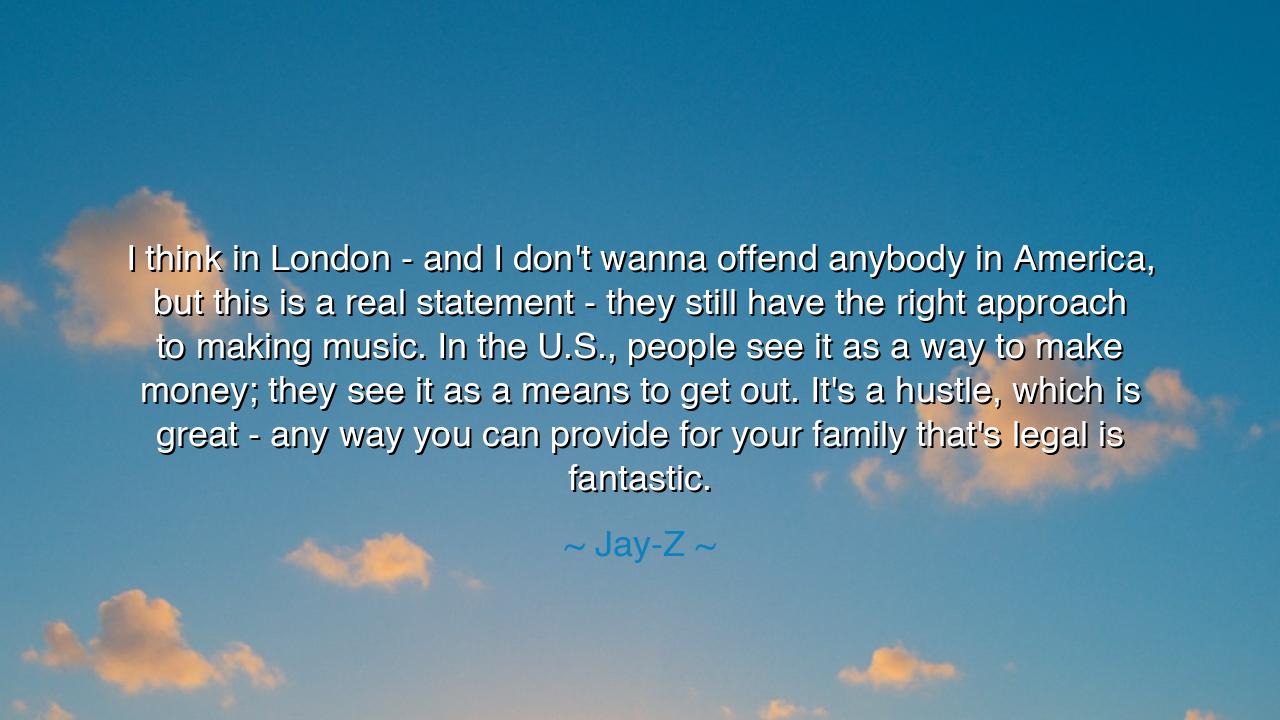
I think in London - and I don't wanna offend anybody in America
I think in London - and I don't wanna offend anybody in America, but this is a real statement - they still have the right approach to making music. In the U.S., people see it as a way to make money; they see it as a means to get out. It's a hustle, which is great - any way you can provide for your family that's legal is fantastic.






Hear the words of Jay-Z, born from the crucible of hardship and risen to the heights of artistry and influence: “I think in London – and I don’t wanna offend anybody in America, but this is a real statement – they still have the right approach to making music. In the U.S., people see it as a way to make money; they see it as a means to get out. It’s a hustle, which is great – any way you can provide for your family that’s legal is fantastic.” In this reflection lies a meditation on art, survival, and the balance between purity of expression and the necessity of livelihood.
At the heart of his words lies the contrast between art as craft and art as hustle. In London, he observes a spirit that clings to the roots of music as an expression of truth, culture, and passion. Music there is approached as devotion, as the shaping of sound into meaning, as a temple where the artist kneels before inspiration. In America, by contrast, he sees the relentless force of survival, where music becomes a ladder out of poverty, a shield against despair, and a vessel for financial liberation. Neither path is without merit; one is the sacrifice for beauty, the other the struggle for bread.
Jay-Z himself is the living story of this hustle. Born in Brooklyn’s Marcy Projects, he witnessed violence, poverty, and the lure of the streets. For him and for many of his peers, music was not an idle pursuit but a weapon against despair, a legal means to carve out dignity and prosperity in a world that denied them both. To turn rhyme into currency, to turn rhythm into livelihood, was an act of survival as much as of creation. His acknowledgment—“any way you can provide for your family that’s legal is fantastic”—is both a justification and a benediction upon this path.
History echoes with such dualities. In the Renaissance courts of Italy, music was supported by patrons, crafted for beauty, sacredness, and refinement. Yet in the slave plantations of America, music was forged as survival—spirituals that carried hope, rhythms that bore endurance, songs that kept humanity alive under the lash. One approach exalted aesthetics; the other preserved life. Both were true. Jay-Z’s reflection simply places this ancient truth into modern form: that art may be either altar or refuge, devotion or hustle, and often both together.
The wisdom of his saying is in the refusal to condemn either path. He honors the purity of craft he sees in London, yet he also honors the necessity of hustle in America. Too often, societies sneer at those who use art as survival, forgetting that hunger crushes the spirit unless it finds an outlet. Yet to live only for the market can also hollow out the heart of music, leaving only empty sounds. Jay-Z’s words are a call for balance: to remember that music must both feed the soul and, at times, feed the body.
Consider the story of Bob Marley, who sang not merely for profit but to awaken the spirit of his people. His music carried rebellion, liberation, and the yearning for justice. Yet it also sustained him and his family, bringing him recognition and security. His life reveals that art can serve both masters—soul and survival—when it is guided by authenticity. In this sense, Jay-Z reminds us that the highest calling is not to choose one over the other, but to find harmony between them.
Therefore, children of tomorrow, heed these words as both caution and inspiration. Do not despise the hustle, for it is born of necessity and dignity. Do not forget the purity of art, for without it music loses its eternal flame. Strive always to create with truth, whether your aim is bread for the table or beauty for the spirit. And if fortune grants you freedom, remember to honor the roots from which your music grew—the passion, the struggle, and the unyielding desire to be heard. For music, whether born in struggle or in sanctuary, remains one of the truest voices of the human soul.






AAdministratorAdministrator
Welcome, honored guests. Please leave a comment, we will respond soon